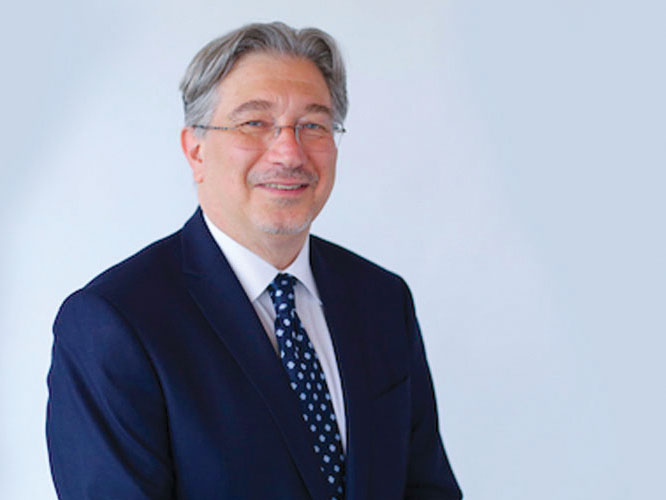
Arshak Abelyan
Staff Writer
The second Artsakh war, initiated by the Republic of Azerbaijan, against the Republic of Artsakh served to relay another reminder to the Armenian people of their past struggles that have now extended into the present.
On Saturday, January 30th, 2021, Eric Hacopian, a political correspondent from CivilNet in Armenia joined the Fresno State community through the Zoom platform to discuss this specific event and the unresolved issues that remain. His talk “The Artsakh War and Armenia: A Conversation with Eric Hacopian,” was moderated by Prof. Barlow Der Mugrdechian, and was conducted in a question-and-answer format.
The 44-day war in Artsakh began on September 27, 2020 and resulted in the deaths of many soldiers and civilians. Young Armenian conscripts, born in the years of 2000-2002, constituted a majority of those who died. Hacopian emphasized this point by saying, “Every day at 10 o’clock at night, you would see the names of everyone who lost their lives on every news station, and you know that half of those kids were born in 2001 and 2002. There is nobody here that is not glad that the war is over.” It was not just lives that were lost, but based on the November 9, 2020 cease-fire statement, seven districts of Artsakh were transferred to Azerbaijani control, forcing many Armenian civilians to seek refuge in the Republic of Armenia.
The end of the war brought forth many questions, many unresolved issues, and many more concerns that were a direct result of this war. “The one institution that had a lot of credibility in this country was the military. There was this myth that you had a competitive military that was capable, unlike other state institutions, and who could do the job well. We found out that is not true, so that is the most devastating thing,” stated Hacopian.
According to Hacopian, the collective issue was the lack of preparation and unprofessionalism on the part of the military which paved the path towards a loss of trust from the public. He explained that Armenian leadership should have placed an emphasis on creating closer ties with other states and organizations diplomatically, which he says was neglected and a failed agenda for the past twenty to thirty years. “We were entirely isolated and had no friends, and as I had said before, Azerbaijan had friends and we [Armenians] had acquaintances,” asserted Hacopian.
When Hacopian was asked why previous Armenian governments were unable to resolve this conflict, he stated that the issue had always been that “Azerbaijan is not interested in compromise, Azerbaijan wants Artsakh back without any Armenians.” He gave examples of political figures such as Armenia’s former President Robert Kocharyan. “In 2001 Kocharyan offered all of the occupied territories except for Lachin in exchange for the independence of Artsakh. From what the stories are, [Azerbaijan’s President] Heydar Aliyev accepted it but then when he returned to Baku, he was talked out of the deal,” said Hacopian.
On the other hand, the current situation also sparked another topic of discussion during this conversation with Professor Der Mugrdechian. When news broke that Prime Minister Nikol Pashinyan signed the trilateral agreement on November 9, many protestors forcibly entered Armenia’s National Assembly building and took to the streets calling for Pashinyan’s resignation. Many images were broadcast showing protestors vandalizing the building and beating the President of the National Assembly of the Republic of Armenia, Ararat Mirzoyan. Hacopian argued that these actions by the protestors, whom he suspects are supporters of the opposition, brought a negative perception towards themselves from the public. For this reason, argued Hacopian, Pashinyan is still in power.
“As long as the alternative to the current Prime Minister is the old regime, Nikol Pashinyan will stay, because as much as people might be disappointed with him thinking he made mistakes or even hate him, the overwhelming majority of people fear the old regime coming back far more so than him,” asserted Hacopian.
As for what lays ahead for the Armenian people, Hacopian believes that there should be a push to build a functional economy that works for the people. His second point is that the current state structure is problematic, and he suggested that it should be restructured or rebuilt from scratch. He also addressed the military and how its development would inevitably create a “military-industrial complex,” which would also bring in efforts to bring back and reintroduce science education and programming work back to the country.
While the future remains uncertain for Artsakh, Hacopian highlighted that the immediate main goal is to solidify the current situation and to maintain the security of the people living in Artsakh. When asked about the long-term solution to the conflict, he responded with the following, “First of all, you are dealing with a neo-fascist regime [Azerbaijan]. Let us just be clear about it, you know you are dealing with a with a regime that has made its entire state identity based on hatred of Armenians.”
Hacopian concluded by saying that he is optimistic about the future and the possible end of the conflict. “People have to reach an understanding that ends this conflict in a way that is fair or perceived to be fair by every party. We won the war in 1994 but we lost the peace, they won the war in 2020 and they could lose the peace, so at some point we are going to have to reach an understanding.”
 Hye Sharzhoom Armenian Action
Hye Sharzhoom Armenian Action